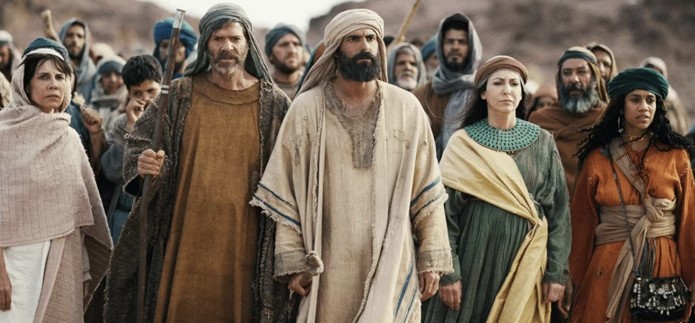The unexpected success of “Testament: The Story of Moses,” a three-part docuseries that topped Netflix’s charts, raises intriguing questions.
Why has this in-depth exploration of a biblical figure captivated audiences in a streaming landscape known for edgy dramas?
Blending dramatic reenactments with scholarly commentary, “Testament” examines Moses’ life and legacy.
While respectfully incorporating Jewish, Muslim, and Christian perspectives, the series firmly grounds itself within the tradition of historic Christianity.
This contrasts with many faith-adjacent titles prioritizing an ambiguous spirituality over specific doctrines.
Moses has long been a compelling, if complex, cinematic figure. Depictions often focus on his charisma and supernatural acts.
“Testament” delves deeper, prompting theological reflection alongside visual spectacle. This decision carries both risks and potential rewards.
Faithful cinematic adaptations of Bible stories face inherent challenges. How does one balance visual storytelling with faithfulness to the source material?
Can a film honor diverse theological perspectives while maintaining a distinct narrative voice?
How do filmmakers address the inevitable gaps in Scripture, where motivations and details are left ambiguous?
Seeking Moral Clarity and Connection Through Storytelling
The current cultural interest in faith-themed content may have several causes.
In divisive times, viewers seek solace in stories offering moral clarity and transcendent purpose, fostering a sense of unity.
Additionally, the rise of streaming services has democratized content creation, leading to more niche offerings catering to underserved audiences.
Furthermore, the “Testament’s” success might reflect a growing openness amongst younger generations to exploring religious topics.
Millennials and Gen Z, less tied to organized religion, seek meaning and show curiosity about spiritual traditions in their search.
“Testament” seems designed to engage viewers with varying levels of biblical knowledge.
For those deeply familiar with the Moses narrative, its analysis of Midrash and Hebrew roots may offer a fresh perspective and enrich their understanding of a well-known story.
Conversely, for viewers approaching the story for the first time, “Testament” is an entry point into biblical history.
And so, it introduces theological concepts that have shaped entire cultures.
This accessibility without sacrificing depth might be a significant factor in its widespread appeal.
Sources like the Jewish publication “Forward” note the series’ surprising success amidst Netflix’s usual offerings.
“Testament,” rather than relying on sensationalism, emphasizes careful analysis of the biblical narrative.
Viewers encounter detailed discussions of Hebrew etymology and Midrashic traditions, rare in mainstream media.
A Biblical Story Through a Christ-Centered Lens
The Christian perspective is also clearly articulated. The significance of the Passover lamb and the Red Sea crossing is explicitly linked to Christ’s redemptive sacrifice.
This unapologetically Christian viewpoint may account for its popularity among a specific demographic.
Kelly McPherson, the executive producer, hopes “Testament” appeals to both familiar and new viewers of Moses’ story.
This aligns with Christianity Today’s focus on making intellectually rigorous faith discussions accessible to a broader audience.
However, some might critique the series as lacking critical engagement with more skeptical scholarly perspectives.
The popularity of “Testament” speaks to a hunger for meaningful content beyond mere entertainment.
Nuanced explorations of faith, rooted in tradition, find an audience, hinting at a shift in popular culture.
Related posts
You Might Also Be Interested In...
Danny Gokey Confronts Cultural Lies in New Music
Danny Gokey, a Grammy-nominated artist, brings his upbeat, hope-filled songs to a new level with his latest album, Sound of Heaven. This album offers uplifting tunes and addresses the deceptive nature of evil. Gokey urges the church to wake up to society’s lies. “Evil is…
Chris Tomlin Features a New Release of “Holy Forever” Featuring CAIN
Chris Tomlin, the well-known Christian music artist, has released a new version of his song “Holy Forever.” This version features the rising band CAIN. The song has had a big impact globally since its first release two years ago. Tomlin wrote “Holy Forever” with Brian…



